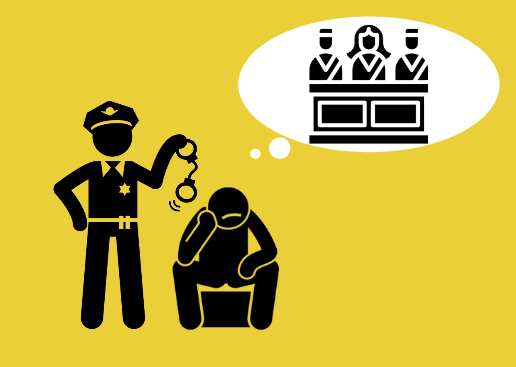This is a process that involves the State Attorney looking at the police file and finding that a substantial amount of evidence has been gathered to constitute an offence.
Usually, after a case has been reported to the police, a file is opened in which all the statements made by the witnesses and the police reports are placed. When this is done, the file is forwarded to the Resident State Attorney where it is sanctioned by a state attorney.
During this process, some files are found to be lacking and are sent back to the police station for further evidence while others are fully sanctioned. Once the file has been sanctioned, the accused person is taken to court.
NOTE: Where the Suspect’s file is returned back to police unsanctioned, the suspect must be released immediately.
What is the process of hearing a petty offender’s case in the Magistrates court?
On the date of hearing the case the following happens;
- The accused person pleads to the charge. The plea can either be a plea of either guilty or not guilty.
- The accused person can also choose to remain silent when the charge is read to him/her.
- Where he/ she pleads not guilty the prosecution opens its case by calling its witnesses, normally, the complainant testifies first.
- These witnesses are then cross-examined by the accused person’s lawyer or the accused himself if he has no lawyer.
- The Magistrate then makes a ruling on whether the accused person has a case to answer.
- If he/she has no case to answer, he/ she is acquitted/ released and if he/ she has a case to answer then he/ she is put on his/ her defence.
- The accused person will then testify. This includes an oral account of what happened in relation to the case.
- The accused will call his/her witnesses to testify.
- These witnesses too will be cross-examined by the prosecution.
- Judgment will be delivered and the accused either found guilty and sent to prison or acquitted (released from prison) or found innocent.
NOTE: One other major consideration these days by courts of law, is that instead of going for a full hearing of a petty offence, they present to the accused persons the option of plea bargain. It’s faster and favours all sides. It is usually done for only those that have spent three months and above and would like to plead guilty to the offences they are charged with.
Role of Justice Centres Uganda in petty offences
- Representing the accused person
- Giving basic legal advice to the family members of the accused person.
Further Readings:
What happens when a family member/ friend has been arrested by the police?
What is Police Bond and who has the mandate to grant it?
What are capital offences and how are they handled?
What is the process of hearing the case of a person accused of a capital offence in the High Court?
What happens when someone is arrested for committing a petty offence?
What is bail and what is it good for?
When and how to apply for Bail in High Court?
When and how to apply for Bail in a Magistrate’s Court?
What is plea bargain and what is it good for?
Sources of information
- The Constitution of the Republic of Uganda 1995
- The Trial on indictment Act Cap
- The Criminal Procedure Code Act Cap 116
- The Magistrates Court Act Cap 16
- The Magistrates Courts (Magisterial Areas) Instrument 2017
- The Judicature (Plea bargain) Rules 2016












One Response
Comments are closed.